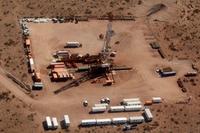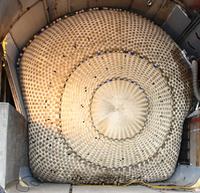-
U.S. nuclear industry strong safety performance in 2011
Studies show that the U.S. nuclear power industry achieved strong safety performance in 2011; U.S. nuclear energy facilities in 2011 recorded the lowest number of unplanned shutdowns in more than a decade
-
-
Industry insiders: insufficient security controls for smart meters
False data injection attacks exploit the configuration of power grids by introducing arbitrary errors into state variables while bypassing existing techniques for bad measurement detection; experts say current generation of smart meters are not secure enough against false data injection attacks
-
-
Stormy weather in Europe's future
Europeis likely to be hit by more violent winter storms in the future; a new study into the effects of climate change has found out why
-
-
2012 National Collegiate Cyber Defense Competition kicks off 20 April

The National Collegiate Cyber Defense Competition (NCCDC) is returning to the University of Texas at San Antonio (UTSA) for the seventh consecutive year; the 3-day national championship will kick off 20 April
-
-
U.S. power and water utilities face daily cyberattacks
American water and energy companies deal with a constant barrage of cyberattacks on a daily basis; these incidents usually take the form of cyber espionage or denial-of-service attacks against the utilities’ industrial-control systems
-
-
Cyberweapon blowback
The real concern about Stuxnet is that its existence demonstrates what is achievable; security analysts are confident that they can stop anything that is a variant of Stuxnet, but the real challenge is stopping something in the style of Stuxnet; this is where the confidence ends
-
-
Nuclear power stations launches emergency operations center
The new 12,000 square-foot facility at the Beaver Valley Power Station supports overall management of activities related to maintaining public health and safety during the emergency at the plant
-
-
Researchers use electricity to generate alternative fuel
Scientists show that we can use electricity to power our cars — even if these cars are not electric vehicles; the researchers demonstrated a method for converting carbon dioxide into liquid fuel isobutanol using electricity
-
-
Alternative to Keystone XL pipeline planned

The Obama administration rejected of the Keystone XL pipeline to carry Canadian oil to refineries on the U.S. Gulf coast, and now two companies are collaborating to develop an alternative plan to achieve the same end
-
-
Fusion presents low proliferation risk
American researchers have shown that prospective magnetic fusion power systems would pose a much lower risk of being used for the production of weapon-usable materials than nuclear fission reactors and their associated fuel cycle
-
-
New nuclear program to address U.K. capability gap
A joint project between the Universities of Manchester and Sheffield for a New Nuclear Build and Manufacturing (NNUMAN) program has been awarded £4 million funding by the Engineering and Physical Sciences Research Council to research innovative manufacturing for the future of the U.K. nuclear power supply
-
-
Water scarcity in California's Bay-Delta necessitates “hard decisions”

Simultaneously attaining a reliable water supply for California and protecting and rehabilitating its Bay-Delta ecosystem cannot be realized until better planning can identify how trade-offs between these two goals will be managed when water is limited
-
-
Containing a tunnel flood with an inflatable giant plug

Researchers have developed a giant plug to contain tunnel floods; the plug inflates (with water or air) to dimensions of roughly 32-feet-long and by 16-feet-wide, and holds 35,000 gallons, about the same capacity as a medium-sized backyard swimming pool
-
-
New laws help cut metal thefts

Metal thefts have become a plague to businesses throughout the country; some states pass laws which require licenses and permits to buy and sell non-ferrous metals; Spartanburg, South Carolina, also requires that buyers pay for the purchases with checks rather than cash, in order to create a paper trail to the seller of the metal
-
-
A swarm of small satellites to deflect menacing asteroids
New research suggests that the best way to divert an asteroid hurtling toward Earth is using a swarm of relatively small satellites flying in formation and cooperatively firing solar-powered lasers onto an asteroid; this would be a more effective way than the current methods being contemplated, which are focused on large unwieldy spacecraft
-
More headlines
The long view
Water Wars: A Historic Agreement Between Mexico and US Is Ramping Up Border Tension
As climate change drives rising temperatures and changes in rainfall, Mexico and the US are in the middle of a conflict over water, putting an additional strain on their relationship. Partly due to constant droughts, Mexico has struggled to maintain its water deliveries for much of the last 25 years, deliveries to which it is obligated by a 1944 water-sharing agreement between the two countries.
Trump Is Fast-Tracking New Coal Mines — Even When They Don’t Make Economic Sense
In Appalachian Tennessee, mines shut down and couldn’t pay their debts. Now a new one is opening under the guise of an “energy emergency.”
Smaller Nuclear Reactors Spark Renewed Interest in a Once-Shunned Energy Source
In the past two years, half the states have taken action to promote nuclear power, from creating nuclear task forces to integrating nuclear into long-term energy plans.
Keeping the Lights on with Nuclear Waste: Radiochemistry Transforms Nuclear Waste into Strategic Materials
How UNLV radiochemistry is pioneering the future of energy in the Southwest by salvaging strategic materials from nuclear dumps –and making it safe.
Model Predicts Long-Term Effects of Nuclear Waste on Underground Disposal Systems
The simulations matched results from an underground lab experiment in Switzerland, suggesting modeling could be used to validate the safety of nuclear disposal sites.
